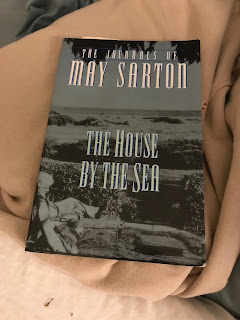Finally, I finished Cutting for Stone by Abraham Verghese. I had read a review in 2010 by a book blogger who loved this book, so I went in with high expectations. It took me three weeks to read, which is a long time for me to spend on one book. The book wasn’t bad enough for me to abandon but not good enough for me to devour, which is quite frustrating. It’s not poorly written, but the character development is weak, especially the development of one of the main female characters (Genet), and the plot moves from tedious and plodding to rambling and implausible. The author, quite obviously, is a surgeon, and an excessive amount of the prose is dedicated to (often gross) details of medical conditions and surgical procedures, which was a problem for someone who reads while eating. If Verghese had omitted all of the medical school informataion, I might have finished the novel in a week and actually enjoyed it. I’m glad I finished the damn thing, but I won’t be recommending it to friends. Now, on to January, my month to read the Russians. First up, Crime and Punishment; Raskolnikov, here I come!
Tuesday, December 27, 2011
Monday, December 5, 2011
Happily Ever After...Really?
Today’s blog entry gets back to the root of why I blog: reading. Over the years I’ve tried to figure out how to explain which books speak most eloquently to me. It seems the common threads are damaged, lonely people who come to some kind of grace and redemption, or at least to some kind of love and communion, in their lives. I suppose these books appeal to me because they make me believe happy endings can exist for those of us who feel adrift and alone in the world.
Instead of reviewing each book, I’m just going to note what I remember most about each one. I liked the pondering of such a multitude of religious “truths” in Life of Pi by Yann Martel. The stark beauty of Kent Haruf’s prose in Plain Song, especially in the chapters inside of the leaving mother’s and the older grieving mother’s minds, was breath-taking and made me cry for the depths which are possible in love. The women-children who either narrate or around whom revolve the books Ellen Foster by Kaye Gibbons and The Honey Thief by Elizabeth Graver made me proud to be a sensible, intuitive, deep-feeling, unbreakable female. I wish our tween and teen culture held girls like these as examples to follow instead of the shallow, over-sexed caricatures they seem to worship. Nightwoods by Charles Frazier and State of Wonder by Anne Patchett were both told from the points of view of solitary, strong but vulnerable women who learned to thrive in their lives in spite of the emotionally dangerous, vast crevasses lurking just below the surface of who they were. (Seeing a pattern here?) Elizabeth Graver describes one of her character’s minds as being made up of night colors and describes his thoughts as being something like stark, grey-limned images. I love how these odd, solitary characters are drawn into each other’s orbits in spite of, or perhaps because of, their detachment and woundedness and find in each other kindred spirits in an inhospitable world of mundane, everyday tragedy.
Instead of reviewing each book, I’m just going to note what I remember most about each one. I liked the pondering of such a multitude of religious “truths” in Life of Pi by Yann Martel. The stark beauty of Kent Haruf’s prose in Plain Song, especially in the chapters inside of the leaving mother’s and the older grieving mother’s minds, was breath-taking and made me cry for the depths which are possible in love. The women-children who either narrate or around whom revolve the books Ellen Foster by Kaye Gibbons and The Honey Thief by Elizabeth Graver made me proud to be a sensible, intuitive, deep-feeling, unbreakable female. I wish our tween and teen culture held girls like these as examples to follow instead of the shallow, over-sexed caricatures they seem to worship. Nightwoods by Charles Frazier and State of Wonder by Anne Patchett were both told from the points of view of solitary, strong but vulnerable women who learned to thrive in their lives in spite of the emotionally dangerous, vast crevasses lurking just below the surface of who they were. (Seeing a pattern here?) Elizabeth Graver describes one of her character’s minds as being made up of night colors and describes his thoughts as being something like stark, grey-limned images. I love how these odd, solitary characters are drawn into each other’s orbits in spite of, or perhaps because of, their detachment and woundedness and find in each other kindred spirits in an inhospitable world of mundane, everyday tragedy.
Subscribe to:
Posts (Atom)
A Kind of Healing
"...to live the slow quiet rhythm of a day as a kind of healing" Several years ago, I discovered May Sarton’s journals. What a b...

-
photo by Anna Reavis "I went to the woods because I wished to live deliberately, to front only the essential facts of life, and...
-
photo by Amy Brandon "You are privileged to read these words so many are barred from. And why are they barred? Because the Nazis...

